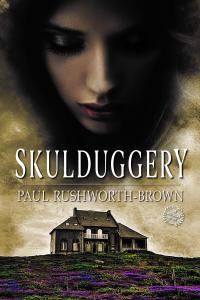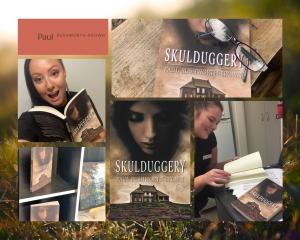Launching a new book: Skulduggery
The word ‘gong’ is derived from the old English, gang, which means ‘to go’ and seems to have been used to describe a privy or latrine since the 11th century
LOS ANGELES, CALIFORNIA, UNITED STATES, November 11, 2021 /EINPresswire.com/ -- The word ‘gong’ is derived from the old English, gang, which means ‘to go’ and seems to have been used to describe a privy or latrine in the early 11th century.
The ‘gong farmer’ was someone who dug out and removed human excrement from privies and cesspits in 14th to 17th century England. Gong farmers were only allowed to work between 9 pm and 5 am as members of the public did not want to see them at work digging and collecting the ‘night soil’.
Night soil is a historically used euphemism for human excreta collected from cesspools, privies, pail closets, pit latrines, privy middens, septic tanks, etc. This material was removed from the immediate area and often transported out of towns and sold on as a fertilizer. The modern term is faecal sludge.
Cesspits were made from brick chambers about six feet deep and four feet wide. They were placed as far away from the house as possible, but sometimes they were installed in the basement and were often placed under cellar floors or in the yard of a house. Some had wooden chutes to carry excrement from the upper floors to the cesspit, sometimes flushed by rainwater. Cesspits were not watertight, allowing the liquid waste to drain away leaving only the solids to be collected. After being dug out, the solid waste was removed in large barrels, which were loaded onto a horse-drawn cart.
A foul odour from cesspits was a continual problem, and the accumulation of solid waste meant that they had to be cleaned out every two years or so. In the late 15th century, they charged two shillings per ton of waste removed.
The working life of a gong farmer was spent up to his knees, waist, even neck in human excrement. It was also an extremely dangerous job, as gong farmers often dug into pockets of deadly poisonous gas and of course risked disease. Sometimes the gong farmer would be overcome by asphyxiation from the noxious fumes produced by the human excrement.
A gang of four men (exclusive of those who have the care of the horses, and who drove the night-carts to and from the scenes of the men’s labours at the cesspools) were set to work. The labour of the gang was divided, though not with any individual or especial strictness, as follows: The holeman, who went into the cesspool and filled the tub, the ropeman, who raised the tub when filled and the tub men (of whom there are two), who carried away the tub when raised and emptied it into the cart.
From this, we can see that much of the work was done from a surface level, and though lanterns were used, it was not necessary to enter the dangerous areas with the lanterns due to the build-up of methane gas. The lanterns were placed nearby or suspended over the work area.
Much of what is known about privies during the 17th and 18th centuries comes from witness statements describing what had been discovered among the human excrement, such as the corpses of unwanted infants.
From the early 17th century onwards the larger towns and cities began to employ scavengers, as they became known, to remove waste from the streets. Much of this effluent came from overflowing privies and dunghills, or from chamber pots emptied into the streets from upstairs windows.
Paul Rushworth-Brown is the author of three novels available in paperback, ebook or KOBO
Skulduggery- The bleak Pennine moors of Yorkshire; a beautiful, harsh place, close to the sky, rugged and rough, no boundaries except the horizon, which in places, went on forever. Green pastures and wayward hills, the colours of ochre, brown and pink in the Spring. Green squares divided the land on one side of the lane, and on the other; sheep with thick wool and dark snouts dotted the hills and dales. The story, set on the Moors of West Yorkshire, follows wee Thomas and his family shortly after losing his father to consumption. Times were tough in 1603 and there were shenanigans and skulduggery committed by locals and outsiders alike. Queen Bess has died, and King James sits on the throne of England and Scotland. Thomas Rushworth is now the man of the house being the older of two boys. He is set to wed Agnes in an arranged marriage, but a true love story develops between them.
Great world-building
4 stars. Great world-building, weak romance, but still worth the read. I hesitate to describe this book as a 'romance' novel simply because the book spent little time actually exploring the romance between Agnes and Thomas. Sure, there is a romance in this novel. Sprinkled throughout the book are a few scenes where Agnes and Thomas meet, chat, flirt and sleep together, have a misunderstanding, then profess their undying love. The meat of this book is far more focused on the story of the plight of Thomas and his brother William and the family living on the moors of Yorkshire in the 17th century. I really enjoyed it. I think the book is historically accurate based on what I have read of the time. I absolutely plan to stick with this author as I enjoyed the descriptive prose, loved the Yorkshire setting, and was intrigued by all of the secondary characters. If you enjoy a solid background story with some dark moments and twists and turns you might enjoy it as much as I did.
Historical fiction at its best!
5 stars. The hype around this book has been unquestionable and, admittedly, that made me both eager to get my hands on it and terrified to read it. I mean, what if I was to be the one person that didn't love it as much as others? (That seems silly now because of how truly mesmerizing Skulduggery was in the most heartbreakingly realistic way.) I knew this one was a must-read!
Paul Rushworth-Brown
Shawline Publishing
email us here
Visit us on social media:
Facebook
Twitter
LinkedIn
Other
Historical fiction told the way it should be!" Join me and author, Paul Rushworth-Brown, LIVE



